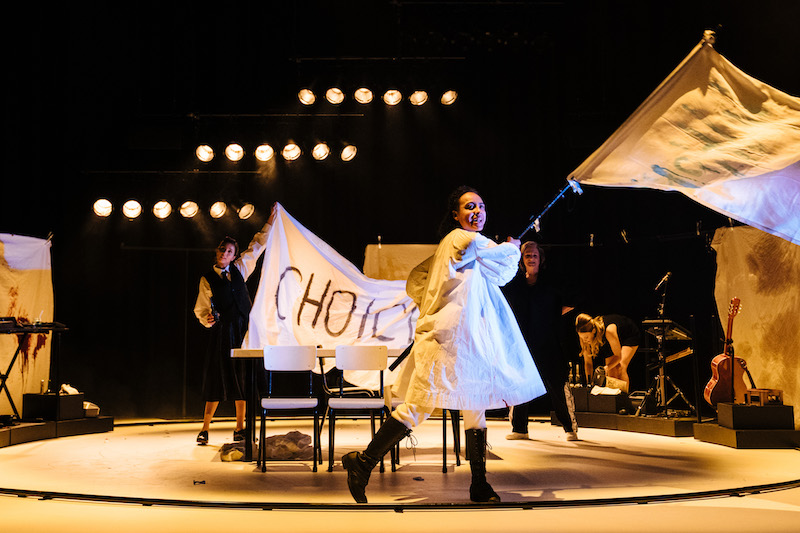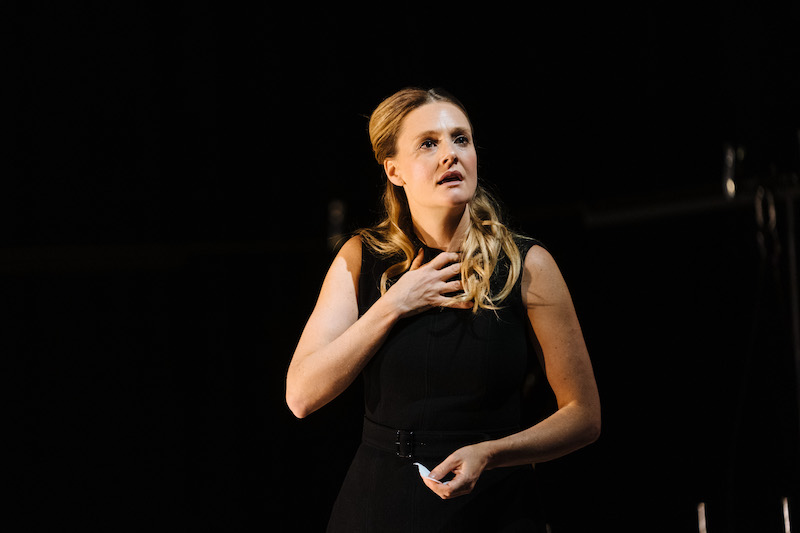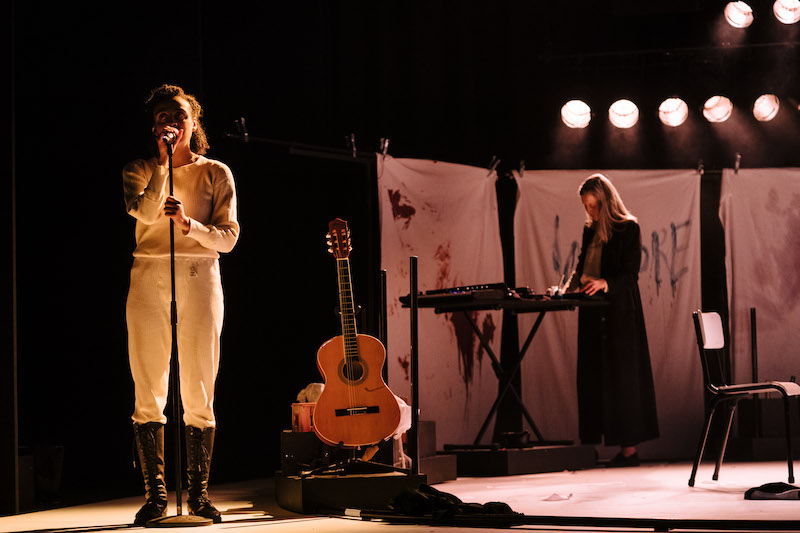Annie Ernaux’s semi-autobiographical book Les Années charts a woman’s life across time and space, history and memory, through what the author describes as a collective consciousness. Perhaps the most satisfying thing about Eline Arbo’s superb adaptation is that it projects this idea through, fittingly, one of the most truly collective performances London has seen in years.
More than that, the communal embrace extends to the audience, in ways that are not always comfortable – the life portrayed, from 1941 to 2006, has its share of hardship – but add to the play’s resonance and appeal. Brilliantly conceived, consummately choreographed and beautifully acted by its all-women cast, it is a bravura, and joyous feat of storytelling.
With In Search of Lost Time, Marcel Proust expended seven volumes and thousands of pages in exploring history, society, and personal experience, through memory. You might say that with her book, published in 2006 and sometimes described as a “hybrid memoir”, Ernaux achieves all of that in one slim volume. One wonders if gender might have something to do with that.
Arbo first directed her adaptation for Het National Theater, in The Netherlands, in 2022. It played at the Almeida from August to September last year, in an English version by Stephanie Bain. I didn’t see that production, but imagine that the quietly dazzling craft in evidence at The Harold Pinter, particularly the fluidity and camaraderie of its tight-knit ensemble, is in part a result of the earlier run.  Its “picture of a life” involves each of the five actors – Deborah Findlay, Romola Garai, Gina McKee, Anjli Mohindra and Harmony Rose-Bremner – taking the baton of playing ‘Annie’, from childhood to old age, as well as her family, friends and lovers.
Its “picture of a life” involves each of the five actors – Deborah Findlay, Romola Garai, Gina McKee, Anjli Mohindra and Harmony Rose-Bremner – taking the baton of playing ‘Annie’, from childhood to old age, as well as her family, friends and lovers.
Juul Dekker’s stage design is minimal but effective, with a potent symbolism. The dominant prop is a long table, which will host family gatherings through generations, and whose white tablecloth doubles as a backdrop for the studio photographs taken of Annie at transitional stages in her development. Cloths are also used to display two politically opposed slogans that appear during the performance: ‘whore’ and ‘choice’. Musical instruments sit at the back of the stage. (Pictured above, left to right, Mohindra, Rose-Bremner, Findlay, Garai).
The women are dressed in black and white, perhaps reflecting what we’re told is the monochrome of those photographic portraits, or, equally, the clear-eyed objectivity of the storytelling.
This follows Annie as she moves from the French suburbs to Paris, through marriage, parenthood, divorce, a career as a teacher and an always side-lined ambition to write. The character is in constant dialogue with herself – never as ‘I’, but ‘we’ – in a way that is both self-reflexive and aware of the changing world around her. That may be political events (Algeria’s fight for independence, Vietnam, the 1968 student revolt, the rise of French nationalism), consumer change (the advents of television, washing machines, the internet) or societal conditions that directly affected women’s lives, notably criminalised abortion and the pill.
Female sexuality is given full expression in the play and offers many examples of its narrative and emotional dexterity. One moment, Anjli Mohindra as teenage Annie is depicting the girl’s ecstatic exploration of her own body, in a terrifically funny demonstration of physical comedy; in the next, the same actor conveys both victim and attacker, and the spectrum of Annie’s emotions (confusion, delusion, disgust, horror, fortitude, trauma) as she’s raped by a teacher.
Similarly, Gina McKee, as middle-aged, divorced Annie, and Romola Garai as her new lover are wonderfully raunchy in suggesting sex on a chair; the next, McKee is desperately moving as, post-affair, she sinks into depression and anger. Reflecting Ernaux’s own style, none of these scenes are laden with value judgement; rather they’re presented almost matter-of-factly, allowing for the actions and the emotions to speak for themselves and for the audience to bring its own response.
Reflecting Ernaux’s own style, none of these scenes are laden with value judgement; rather they’re presented almost matter-of-factly, allowing for the actions and the emotions to speak for themselves and for the audience to bring its own response.
This communal feel of the play is epitomised by a scene involving Annie’s backstreet abortion in the 1960s. Garai (pictured above) powerfully depicts both the procedure and its grisly aftermath. When it’s over, the other four actors share the task of cleaning the blood from her hands and bare legs, almost ritualistically, in an expression of sisterhood that washes away the injustice of what has just happened.
It's a stunning, disturbing sequence, but also a moment in which the audience itself comes into play. On the evening I saw it, but not for the first time, Garai’s performance was suddenly halted, and the lights came up, as theatre staff attended to some audience members distressed by what they’d been seeing. This lasted for 10 minutes at least, while Garai and her fellow actors stood in the shadows backstage, patiently waiting. It’s a wonder that any of them, let alone Garai, could pick up where they’d left off. But they did. And, as unplanned and of course unwanted as it was, the episode somehow added to the reverberating sense of shared experience.  Whatever the underlying seriousness, for much of the time the play is pure joy. Collectively, the actors persuasively portray an Everywoman, whether enlightened and politically engaged, or apathetic, passionate or bereft, lost or found. They also have great fun playing across age and gender, both petit-bourgeoise mothers and their sullen boys (the sight of the oldest actors, McKee and Findlay, boisterously playing young brats is typical of the play’s time-defying ethos). They sing, in English and French, they dance, their play instruments, songs adding texture to proceedings.
Whatever the underlying seriousness, for much of the time the play is pure joy. Collectively, the actors persuasively portray an Everywoman, whether enlightened and politically engaged, or apathetic, passionate or bereft, lost or found. They also have great fun playing across age and gender, both petit-bourgeoise mothers and their sullen boys (the sight of the oldest actors, McKee and Findlay, boisterously playing young brats is typical of the play’s time-defying ethos). They sing, in English and French, they dance, their play instruments, songs adding texture to proceedings.
While Harmony Rose-Bremner (pictured above, left, with McKee) has less drama to deal with as child Annie, she is a frequently hilarious, charming, and highly musical presence, one highlight being her leading the others in a Jane Fonda-style aerobic workout, while singing Taylor Dane’s Tell it to My Heart. The gloriously mismatched synchronicity of the troupe is just one pleasure that will be lodged in the memory.
- The Years at Harold Pinter Theatre until 19 April 2025. Romola Garai will be in performances until 8 March
- More theatre reviews on theartsdesk















Add comment